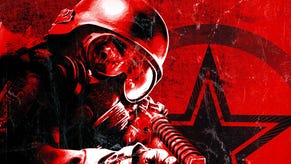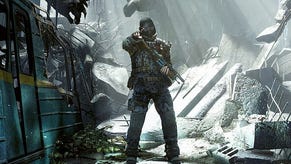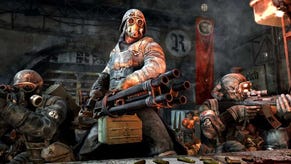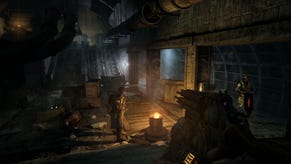Living on a prayer - Metro: Last Light in the flesh
Those that count Twitter, iced-tea and cat memes as everyday essentials are invited to walk a mile in Artyom’s shoes. Eyes-on impressions of one of THQ’s brightest hopes for the year ahead, new screens included.
It wasn’t always this way. Back before the sky was scorched, people lived and played amongst streets now choked thick with old world detritus. Perched precariously on the edge of existence, squinting toward a shrouded horizon, you ponder how that must have felt; to live above ground, to have the luxury of a clear, expansive sky to gaze upon and clean air to breathe.
You look skyward to the ever present mass of tumultuous cloud and a few drips start to fall from the poisoned sky, splattering on your mask and obscuring your vision, you wipe away the drops and glance at your watch; in a little over three minutes this beat up, second-hand air filter will stop removing the worst of the toxins and start letting in air that burns your lungs and shortens your life; it’s time to hustle, a storm is coming.
Metro: Last Light is an evocative and moody first-person shooter with survival horror aspirations set against the bleak backdrop of a post-apocalyptic world. Like its predecessor, Metro 2033, the majority of the action takes place in the titular Russian metro system but Last Light also features a greater focus on the ruined over-world, which has allowed Ukrainian developer 4A Games to go to town on depicting a world gone to hell.
Everywhere you look, incidental details catch the eye, piles of now useless 21st century technology form obstacles to be clambered over or circumvented; burnt out vehicles, seared concrete and the twisted innards of buildings lay ruined alongside once precious personal affects that have been rendered useless by the nuclear catastrophe.
As morbidly appealing as Last Light’s macabre beauty is, there’s little time to stand still and marvel at its sights as the very air around you can kill should the ever-visible digital read-out that measures the usefulness of your air filter reach zero. If the air doesn’t end you, perhaps the packs of feral mutants will, their bodies misshapen by the poisoned environment and their numbers overwhelming; or perhaps it will be an aggressive rival metro dweller, hoping to pick over your still-warm corpse for trinkets, ammo or those oh-so-precious air filters.
"We want the player to feel threatened by the environment and the foes that they face,” says THQ’s head of global communication, Huw Beynon. “We want them to wonder whether they're equipped to deal with what they're going to face out there; so, you should feel scared that you may not have enough resources to make it to the end of the level, but more immediately, you’ll be wondering whether you have enough equipment to make it through the next few seconds."
While air filters may be the most vital commodity in Last Light’s harsh ecosystem, there’s more to be concerned about than oxygen alone: if you’re caught unawares by the savage wildlife that roams above ground, having breath in your lungs will do little but allow you to scream. Being able to see what’s lurking in the dark is also crucial; outside that means ensuring your mask is kept clear by regularly wiping away the rain that blurs and obscures your vision. Inside, it’s necessary to keep your helmet-mounted flashlight illuminating the passages ahead by way of a hand-powered dynamo and just as important to have a trusty lighter to hand.
The final bare-necessities shown during the gameplay demo are staples on which the whole genre relies: good ol’ fashioned guns and bullets. The former has the piecemeal look of firearms that have been industriously cobbled together from the abundance of wreckage, while the latter doubles as currency, as it did in Metro 2033. However, something Beynon says in passing suggests there may be more flexibility built into the system this time around.
"We're going to keep [bullets as currency] in,” he confirms. “One of the things we're trying to reconcile is how we communicate that to the player and how the interface works. We're focusing much more on how we introduce those mechanics this time around.
“There's more to consider too, we really don't want to lose any of the complexity as we think that players enjoy having lots of tools and tricks at their disposal. So, with the secondary fire of weapons, for example: some weapons will be able to swap to old-world ammo, which doubles as your currency.”
Given the lengths that 4A has gone to in order to inject the notion of survival and on-the-fly resource management into its world, it’s a shame there isn’t the option to go all-out and ditch aids like the air supply indicator in favour of having to listen to protagonist Artyom’s breathing for clues as to when a filter needs to be changed.
On the subject of the filters, given how precious they are to every inhabitant of Metro’s world, it’s slightly curious just how many of them are lying around in none-too-hard to reach places; but on such convenient contrivances are videogames built and fleeting ponderings such as these quickly fall by the wayside when the tension ratchets up.
This is exemplified brilliantly by a few minutes spent exploring a downed aircraft, which has become a metallic tomb for its deceased and decomposed passengers; the eerie quiet of the ruined cabin is punctuated by hallucinations depicting the final moments of the doomed flight. At this stage, the real star of the show is the oppressive environment that, at times, has the ability to make you feel very small and worryingly powerless; something Beynon attributes to 4A’s geographical backdrop.
"The development team is in the shadow of probably the world's most famous post-apocalyptic environment and can see how nature reclaims after decades of neglect in and around Chernobyl, so I think they have a lot of first-hand experience and understanding of what that environment should look and feel like.
“We take a certain amount of liberty with it, the world has to feel real but at the same time we want to show spectacle."
It may revel in its artistic licence, but Metro: last Light is shaping up to be a chillingly atmospheric breath of toxic air.
Metro: Last Light launches on PC, Wii U, PS3 and 360 early 2013.











